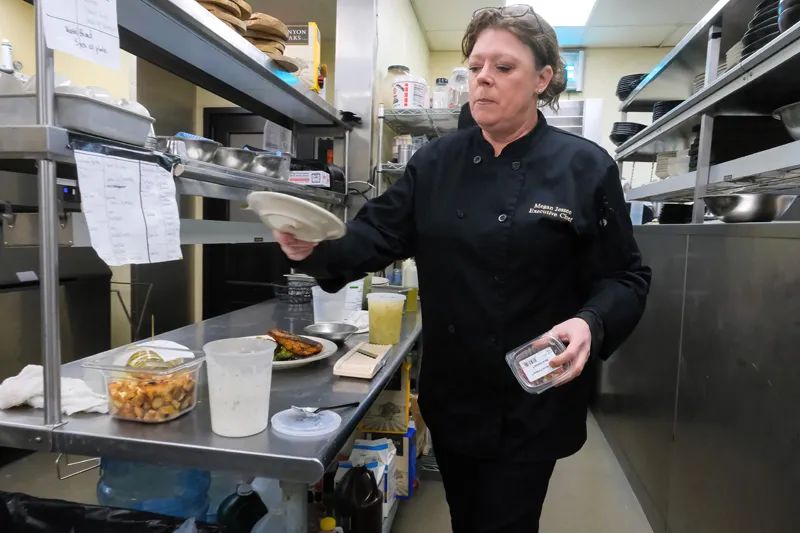
Recipes for Embracing Opportunity
Chef Megan Jessee brings new flavor to the Granary
Megan Jessee holds the recipe for embracing opportunities, with fate always leading her to new possibilities. Over the years, she has cooked up new adventures under the Big Sky and elsewhere. She honed her knowledge of food and cooking in her journeys, and those ingredients have now guided her back home.
At the end of last year, she took the executive chef position at The Granary. With her reign in the kitchen, she has cooked up a more “approachable” menu, wanting to make this historic restaurant the neighborhood eating, drinking and gathering place.
As for the menu, Megan says, “I basically thought about things that I would make for somebody coming over to my house.” With chicken as her go-to, Roasted Half Chicken is on the menu, served with garlic mashed potatoes, honey chicken jus and chive lemon oil.
The new offerings are playful, with diverse options highlighting local bounty, including trout, elk, bison and Montana wagyu. Shrimp, ahi tuna and oysters make for the choices from the sea. Nachos have returned, and the Poly Street Pasta has been renamed the Granary Pasta. The Big A** Pretzel and Cauliflower Steak are some of the new options.
“I learned to cook as self-defense,” Megan says. “My mom was a terrible cook, but she’s a good cook now. At 8 or 9 I would do stir-fry and my brother would cook hot dogs with mac and cheese.” She admits she “clipped recipes from Women’s World magazine” to expand her cooking repertoire.
Mostly she credits her mother’s mother, Helen Stallard, for inspiring her love of cooking. “I got to go to Miles City to cook with Grandma,” Megan says.
She says they did “a little bit of baking,” making lemon squares and chocolate chip cookies, but “Grandma concentrated on savory cooking.” With a laugh, she recalls “catching a catfish in the golf course pond” and then cooking it with her grandmother.
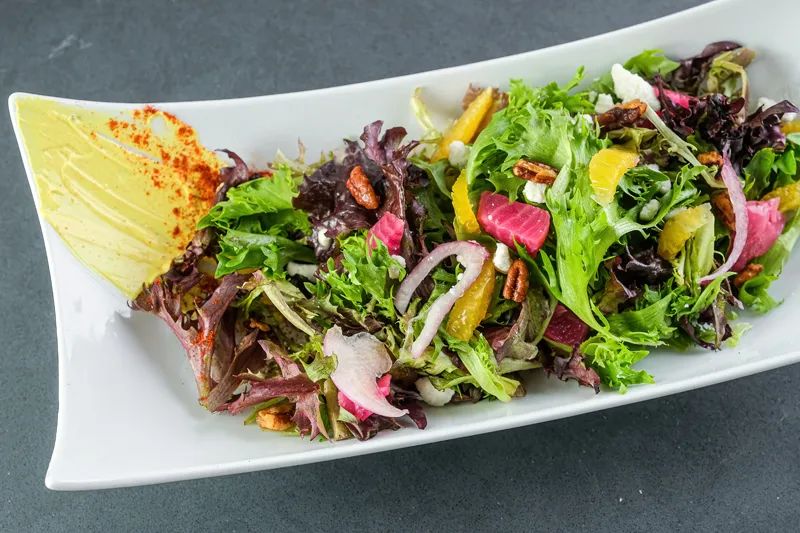
Over the years, as Megan regularly helped her grandmother prepare roast and make the mashed potatoes that she so loved to eat, she earned the term of endearment, “Mashed Potato Kid.”
“She canned a lot,” Megan says of her grandmother. “I canned with her. She made pickles and relishes – red pepper, jalapeño. My mother now makes the relishes in giant batches. They are a legacy thing.” Her mother, she adds, now is in the habit of gifting jars of the fermented goods to friends and relatives for the holidays.
“I was not a picky eater,” Megan says, recalling only a few specific foods that she didn’t like, one of them being canned chow mein. She jokingly says of her mom’s enticing tactics, “Even when my mother added chopsticks, calling them magic sticks, it didn’t make the dish cooler.”
In high school, she worked in the food world as a busser at a buffet restaurant. When two cooks didn’t come into work, she donned an apron and entered the kitchen. She laughs saying, “I think they didn’t know that women did not cook in the kitchen at that time.”
After graduating from West High School, she began studies at MSU Billings in biochemistry, putting that on pause to head to Washington, D.C., to be a nanny. Her employer, a United Airlines pilot with two children, put the world at Megan’s feet. Unlimited domestic travel coupons and companion tickets took her across the United States and to Europe. At night she bartended at a Pakistani restaurant, and then, once again, a cook didn’t show up for work, sending her into the kitchen.
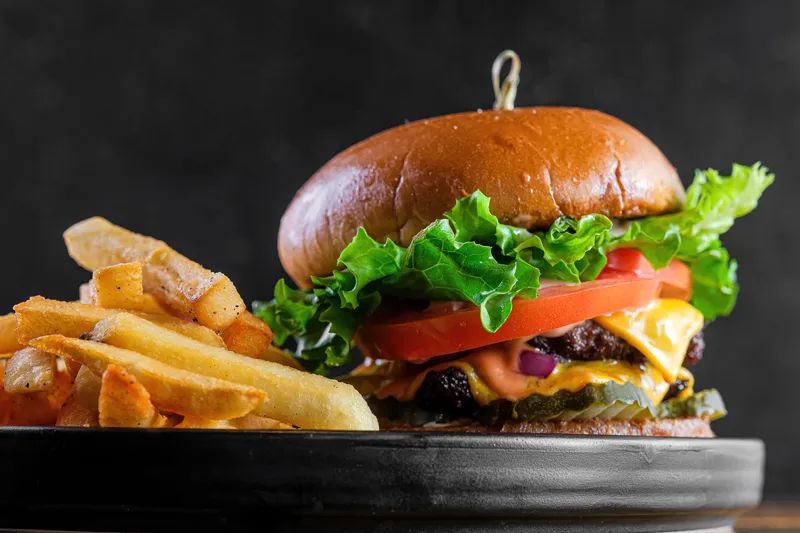
From D.C., she traveled to San Francisco to take on a short-lived nanny position before returning to Billings. Here, she became the “house manager” for physicians Bonnie and Ed Dean and their two sons. “They hired me to fix dinner for them. I learned to make fresh pasta. I learned to make mussels.”
She laughs at herself as she admits being surprised that the mussels were live creatures. “I did not know how to debeard them. Bonnie would call me and give me directions on how to handle the mussels.” The Deans provided the recipes for the dishes they wanted to be served, which introduced Jessee to the traditional dishes from “Mastering the Art of French Cooking,” by Julia Child, and cookbooks by Jacques Pepin.
During this time, she was dating a “guy who would take me to Vegas. We ate at Le Cirque and Picasso.” The dining experiences exposed her to elevated food and ingredients. In town, he took her to dine at Carl Kurokawa’s Juliano’s Restaurant. During her visits, she expressed her desire to cook. Kurokawa advised her to pursue an education. “Just learn the right way,” he told her. “Go to school.”
Approaching 30, Megan left for Hyde Park, New York, and enrolled at the Culinary Institute of America. Older than most of the students, her wisdom and nanny skills came into play when she took on the role of resident adviser in the dorms. In class, culinary instructor Eve Felder, who had been a chef at Chez Panisse, took Megan under her wing. The relationship led her to stodge at Chez Panisse to work at Oliveto Restaurant and Café in Berkeley and Quince in San Francisco.
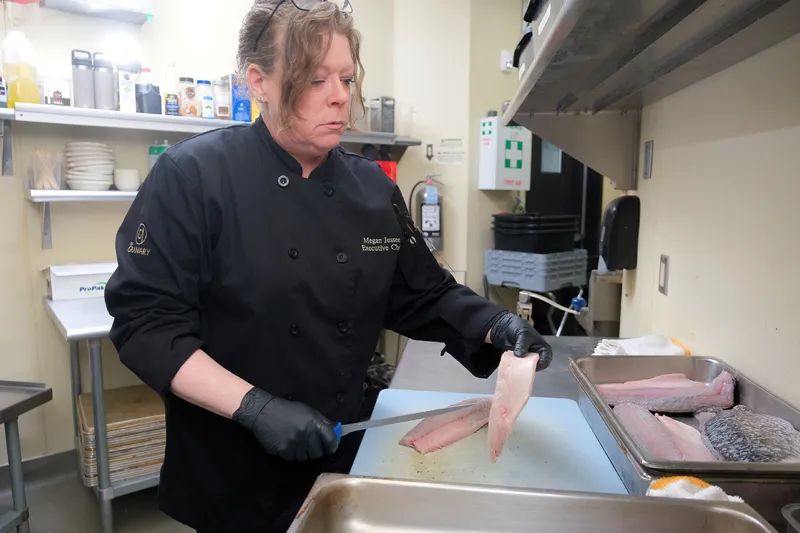
Chez Panisse, the restaurant opened by Alice Waters in 1972, created the farm-to-table movement. Later she founded the Rome Sustainable Food Project in Italy. The connection brought Megan to the project, which practiced growing food and supporting local farms and suppliers by bringing local food to the table.
“The cultural experience was really cool,” she says. “I got hands-on experience working the land and creating in the kitchen.”
Missing home and family, Megan made the move back to Montana to work as the executive chef at Sydney’s Mountain Bistro in West Yellowstone for a season before returning to Billings.
For the next couple of years, she helped others join the culinary community. As the manager and chef instructor for the Culinary Arts Program at Passages, a community-based correctional facility for women, she provided classroom instruction and in-house food service experience for those in the pre-release program. Later she joined the Montana Restaurant Association Education Foundation as the program manager/ProStart coordinator. ProStart brings together the foodservice industry and the high school classroom to teach students culinary skills and restaurant principles.
“I liked pushing their boundaries and teaching them where food comes from,” Megan says.
A job opening for a chef position at the Glacier Park Lodge lured her back into working in the kitchen. When given the chance to be part of the new culinary team at the Sage Lodge, she relocated to Pray to be the sous chef and banquet chef, and quickly took on the interim executive chef position. The frequent changes in the kitchen leadership, however, left her overworked and frustrated.
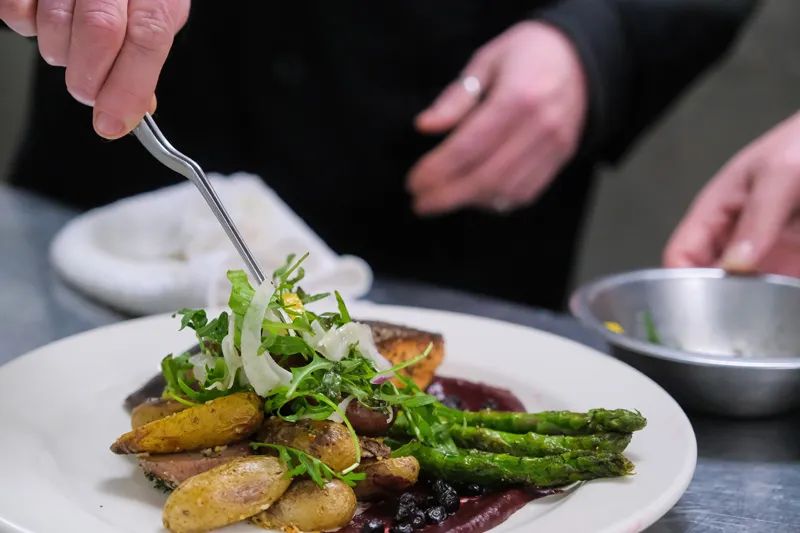
She departed Paradise Valley to consult briefly for Rock & Brews in Milwaukee, Wisconsin. The opportunity to reestablish roots and to close the circle of a nomadic life brought Megan back to Billings and the Granary. These days she finds joy in sharing her knowledge and passion for food with not only her diners but with her staff. Recently she took the team on her own dime on an exploration of Mexican food, tasting fare from Camacho’s Tacos and Los Mayas. She plans on continuing these food journeys to further her crew’s culinary knowledge.
For now, this chef finds comfort in the Granary kitchen. “Every connection I have made,” Megan says, “is coming together right now in this particular time.”











